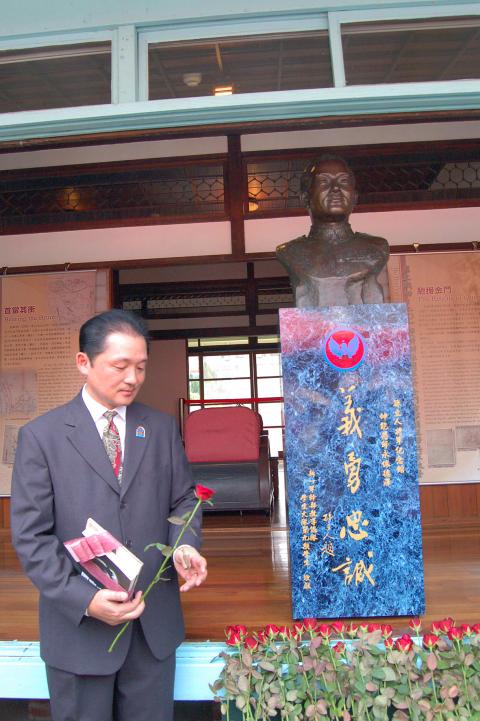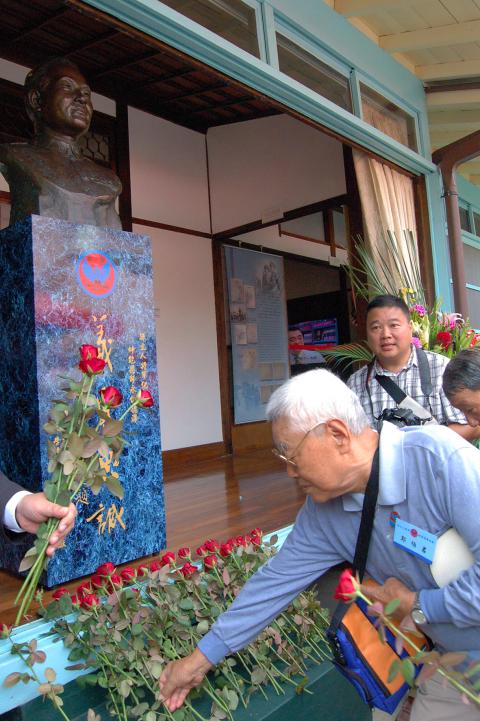Soldiers and staff formerly under the command of General Sun Li-jen (孫立人) gathered on the eve of the Mid-Autumn Festival to attend the opening ceremony of the Sun Li-jen Memorial Hall in Taipei on Saturday.
Sun, called the “Rommel of the East” by his Western counterparts, was present in many of the battles of the Second Sino-Japanese War, including the Republic of China’s (ROC) military deployment in the so-called China-Burma-India theater, winning acclaim for providing relief to British forces in the region and re-establishing the Ledo Road, the alternative to the Burma Road, which was the primary supply route of the ROC’s Western allies before it was cut off by Japanese forces.
Erwin Rommel was a German general who participated in both World Wars and is most recognized for his desert warfare tactics in Nazi Germany’s North African campaign — fought primarily between the British Commonwealth and Axis allies Germany and Italy.

Photo: Su Meng-chuan, Taipei Times
On the eve of the Mid-Autumn Festival 65 years ago, Sun led the officers of the New 1st Army of the Nationalist Forces to Taiwan, relocating a training center to the island in an effort to train more troops for the ongoing civil war between the Chinese Nationalist Party (KMT) and the Chinese Communist Party.
One of the members of this force, 85-year-old Teng Hsueh-jui (鄧雪瑞), said that when they were training in northeastern China, Sun had always striven to make sure they had enough hot water to bathe with and leather coats to ward off the cold, adding that the general treated his soldiers just as he would his family.
“If it had not been for the general, we [the officers under his command] would not have been able to make a life in Taiwan,” Teng said.

Photo: Su Meng-chuan, Taipei Times
To commemorate the general, the soldiers under his command collected funds to make a bronze statue of him — cast by artist Wang Hsiu-chi (王秀杞) — and donated it to the Sun Li-jen Museum, located in the house in which Sun had been kept under house arrest for 33 years.
In 1955, Sun was relieved of his command by former ROC leader Chiang Kai-shek (蔣介石) due to allegations that he was planning a mutiny and sheltering Communists, and he was kept under house arrest until the order was remanded by then-president Lee Teng-hui (李登輝) in 1988. However, Sun was only able to enjoy his freedom for two years before passing away in 1990.
His second son, Sun Tien-ping (孫天平), said on Saturday that his father often said he had never done anything that he regretted, but he did feel apologetic toward his former subordinates.
“I wish to thank everyone for not giving up on my father and even collecting funds to make a statue in his honor,” Sun Tien-ping said, adding that he firmly believed “justice and history would restore the truth of the matter.”
Taipei City Hall has registered Sun’s residence as a historic heritage site and, with the agreement of Sun’s family, has turned the house into a memorial museum, which is open on the second and fourth Sunday of every month.

The manufacture of the remaining 28 M1A2T Abrams tanks Taiwan purchased from the US has recently been completed, and they are expected to be delivered within the next one to two months, a source said yesterday. The Ministry of National Defense is arranging cargo ships to transport the tanks to Taiwan as soon as possible, said the source, who is familiar with the matter. The estimated arrival time ranges from late this month to early next month, the source said. The 28 Abrams tanks make up the third and final batch of a total of 108 tanks, valued at about NT$40.5 billion

Two Taiwanese prosecutors were questioned by Chinese security personnel at their hotel during a trip to China’s Henan Province this month, the Mainland Affairs Council (MAC) said yesterday. The officers had personal information on the prosecutors, including “when they were assigned to their posts, their work locations and job titles,” MAC Deputy Minister and spokesman Liang Wen-chieh (梁文傑) said. On top of asking about their agencies and positions, the officers also questioned the prosecutors about the Cross-Strait Joint Crime-Fighting and Judicial Mutual Assistance Agreement, a pact that serves as the framework for Taiwan-China cooperation on combating crime and providing judicial assistance, Liang

A group from the Taiwanese Designers in Australia association yesterday represented Taiwan at the Midsumma Pride March in Melbourne. The march, held in the St. Kilda suburb, is the city’s largest LGBTQIA+ parade and the flagship event of the annual Midsumma Festival. It attracted more than 45,000 spectators who supported the 400 groups and 10,000 marchers that participated this year, the association said. Taiwanese Designers said they organized a team to march for Taiwan this year, joining politicians, government agencies, professionals and community organizations in showing support for LGBTQIA+ people and diverse communities. As the first country in Asia to legalize same-sex

MOTIVES QUESTIONED The PLA considers Xi’s policies toward Taiwan to be driven by personal considerations rather than military assessment, the Epoch Times reports Chinese President Xi Jinping’s (習近平) latest purge of the Chinese People’s Liberation Army (PLA) leadership might have been prompted by the military’s opposition to plans of invading Taiwan, the Epoch Times said. The Chinese military opposes waging war against Taiwan by a large consensus, putting it at odds with Xi’s vision, the Falun Gong-affiliated daily said in a report on Thursday, citing anonymous sources with insight into the PLA’s inner workings. The opposition is not the opinion of a few generals, but a widely shared view among the PLA cadre, the Epoch Times cited them as saying. “Chinese forces know full well that